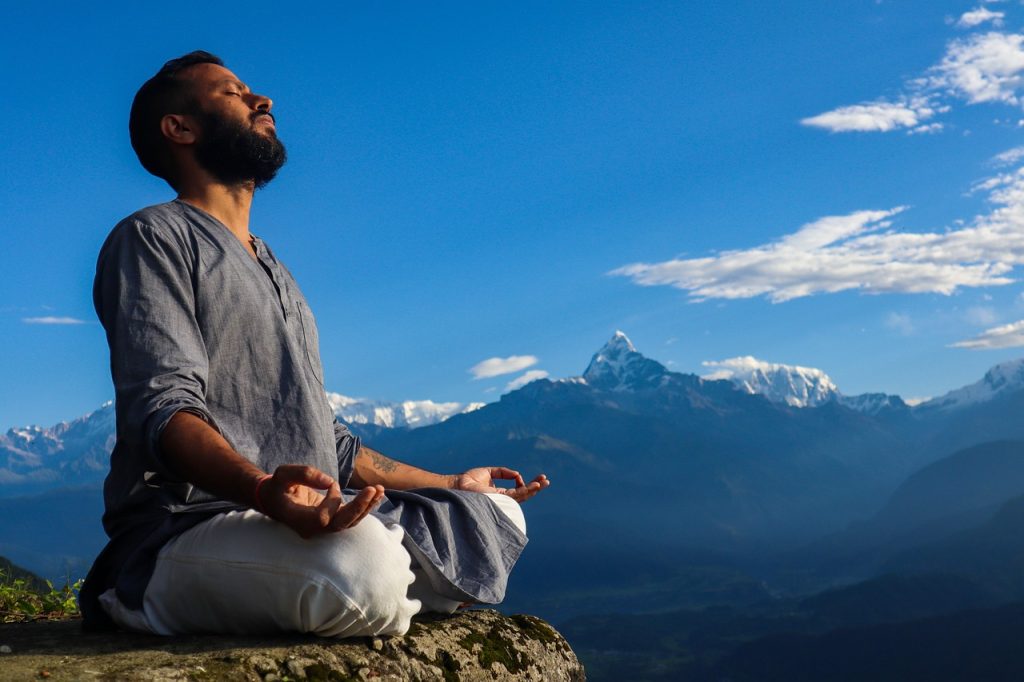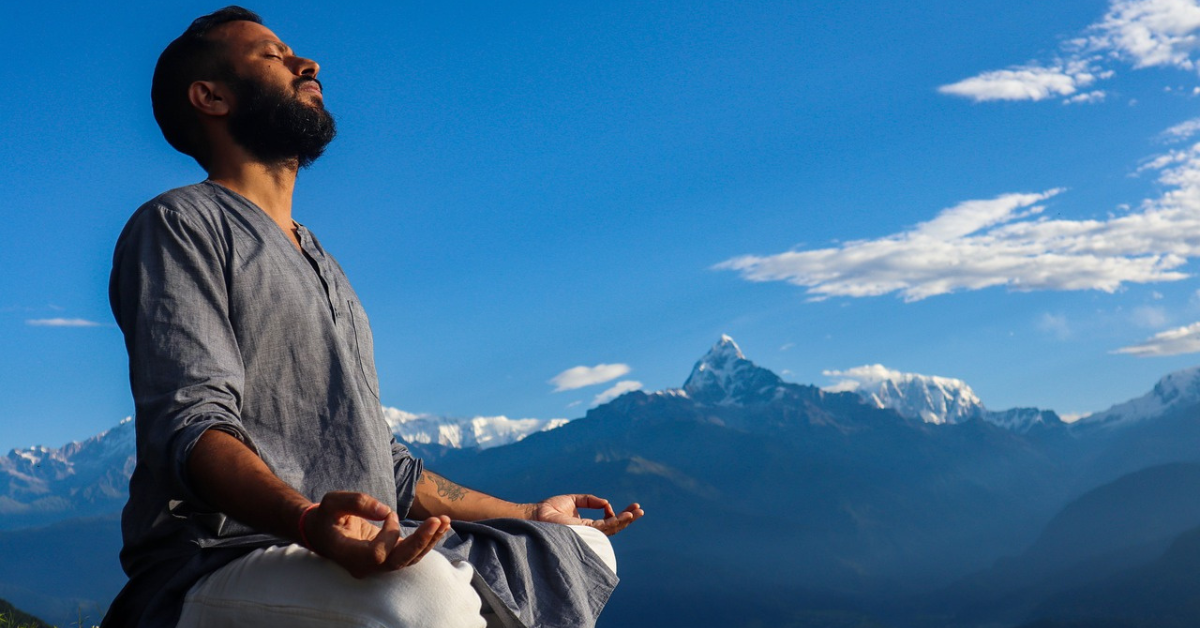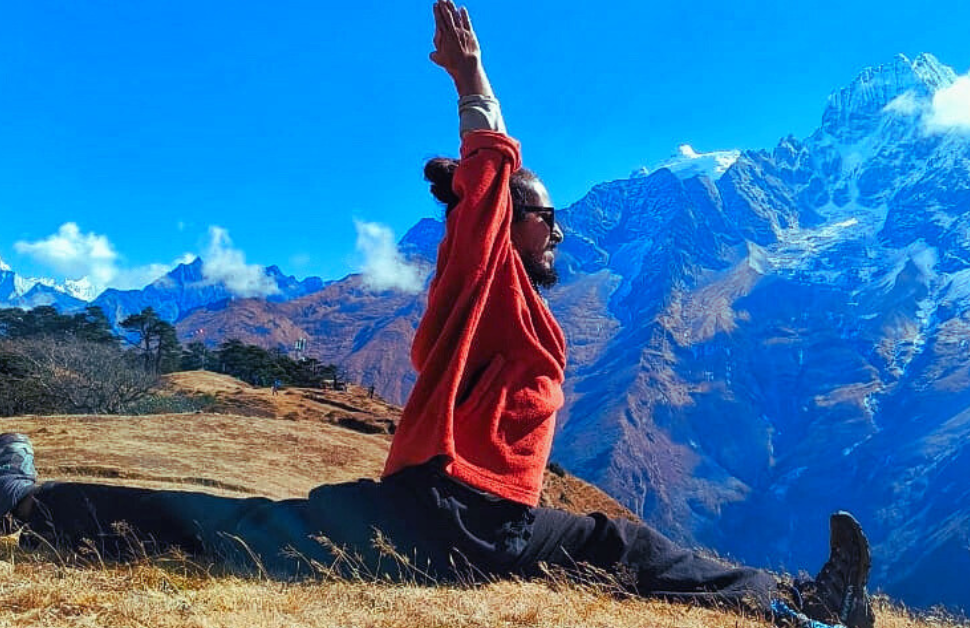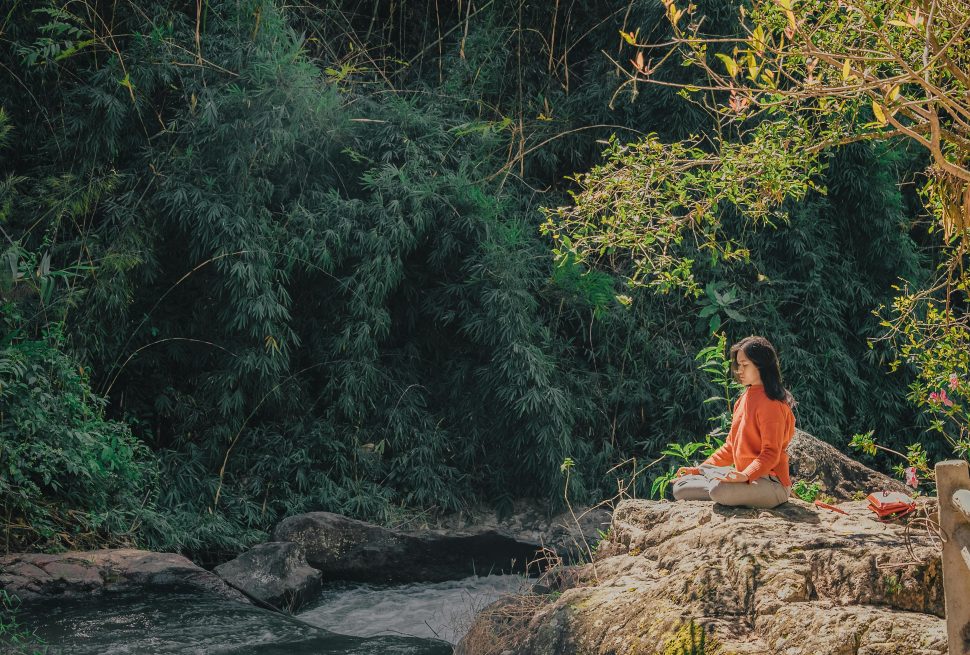Leaving the things behind, living the life afterwards and doing what the soul asks for, that is what all of us would wish to do in our lives. But it is just not possible to follow through practically as we are attached to them, we have responsibilities towards those things and those people.
What remains for us are those wishes, even if not forever, we can leave things behind for a while and be a part of the journey of a human soul or spirit.
Journey to a place away from the home and away from the relations, to the naturally available places such as green forests, rocky trails, countryside, Himalayan trails, that has minimum human intervention and maximum environment for soul’s retrieval, that is called “Spiritual Adventure”.
Nepal has a diverse landscape within a small small area of around 147k sq. km. Even till the date, there are villages with minimal western influence and places that might keep one away from sufferings offered by this life of ours. We, the team of Manasukh aim for spiritual, mental, emotional and physical well-being of anyone that longs for it.
Types of Spiritual Adventures
There are actual methods in life we can follow in order to achieve the spiritual well-being of a person some of them include:
Yoga Practices
Yoga, an ancient practice believed to have originated in India, offers an embarking approach to spiritual growth. It combines physical postures (asanas), breathing techniques (pranayama), and meditation to unite body, mind, and spirit. Regular yoga practice can increase flexibility, strength, and balance while reducing stress and promoting inner peace. Beyond the physical benefits, yoga cultivates mindfulness, self-awareness, and a deeper connection to one’s inner self. Many practitioners report experiencing heightened spiritual awareness and a sense of oneness with the universe through consistent yoga practice.
Mantra Chanting
Mantra chanting involves the repetition of sacred sounds, words, or phrases, often in Sanskrit. This practice is believed to create powerful vibrations that can transform consciousness and connect the practitioner with higher realms of spiritual energy. Chanting can be done silently or aloud, alone or in groups. Regular mantra practice can calm the mind, reduce anxiety, and foster a deep sense of inner peace. Many find that certain mantras resonate with them personally, providing comfort, inspiration, and spiritual insight. The rhythmic nature of chanting can also induce meditative states, facilitating profound spiritual experiences.
Healthy Diet
The food we consume doesn’t just nourish our bodies; it also affects our minds and spirits. A healthy, balanced diet can support spiritual growth by enhancing clarity of thought, increasing energy levels, and promoting overall well-being. Many spiritual traditions emphasize the importance of pure, wholesome foods. Some advocate for vegetarian or vegan diets, believing them to be more conducive to spiritual development. Mindful eating practices, such as expressing gratitude for meals and eating with full awareness, can transform the act of nourishing the body into a spiritual practice in itself.
Indulging in pilgrimages
Pilgrimages involve journeying to places of spiritual significance, often sites associated with religious or historical importance. These sacred journeys provide opportunities for reflection, purification, and spiritual renewal. Pilgrims often report profound experiences of personal transformation, heightened spiritual awareness, and a sense of connection to something greater than themselves. No matter which location you choose for your journey, walking along the himalayan regions of Nepal, you will be exploring ancient spiritual sites, pilgrimages offer a unique blend of physical journey and inner exploration, often leading to deep spiritual insights and personal growth.
Preparing for Your Spiritual Adventure
Before embarking on your spiritual adventure, it’s essential to prepare yourself mentally, emotionally, and physically. Here are some tips to help you get started:
1. Set Clear Intentions
- Reflect on your motivations for seeking a spiritual adventure
- Define your goals and expectations
- Be open to unexpected experiences and insights
2. Cultivate an Open Mind
- Let go of preconceived notions and beliefs
- Embrace uncertainty and the unknown
- Practice non-judgment and acceptance
3. Develop a Regular Spiritual Practice
- Establish a daily meditation or prayer routine
- Keep a spiritual journal to record insights and experiences
- Engage in regular self-reflection and introspection
4. Seek Guidance and Support
- Find a spiritual teacher or mentor
- Join a like-minded community or support group
- Attend workshops, retreats, or classes related to your spiritual interests
Navigating Challenges on Your Spiritual Adventure
As with any journey, a spiritual adventure can come with its own set of challenges. Here are some common obstacles you may encounter and how to overcome them:
1. Doubt and Skepticism
- Acknowledge your doubts as part of the journey
- Practice patience and persistence
- Seek evidence through personal experience rather than relying solely on belief
2. Ego Resistance
- Recognize when your ego is holding you back
- Practice humility and surrender
- Embrace discomfort as an opportunity for growth
3. Spiritual Bypassing
- Avoid using spirituality to escape real-life problems
- Address emotional and psychological issues alongside spiritual practice
- Seek professional help when needed
4. Maintaining Balance
- Integrate spiritual practices into your daily life
- Find harmony between spiritual pursuits and worldly responsibilities
- Avoid spiritual materialism and the trap of seeking experiences for their own sake
Integrating Your Spiritual Adventure into Daily Life
The true value of a spiritual adventure lies in how it transforms your everyday existence. Here are some ways to integrate your spiritual experiences into daily life:
1. Mindful Living
- Practice presence and awareness in all activities
- Cultivate gratitude for life’s simple pleasures
- Approach challenges with equanimity and compassion
2. Service and Compassion
- Look for opportunities to help others
- Volunteer for causes aligned with your values
- Practice random acts of kindness
3. Continuous Learning and Growth
- Stay curious and open to new spiritual insights
- Regularly revisit and refine your spiritual practices
- Share your experiences and learn from others on similar paths
4. Creating Sacred Space
- Designate a area in your home for spiritual practice
- Surround yourself with inspiring objects and imagery
- Regularly cleanse and energize your personal spaces
What is a Spiritual Adventure?
A spiritual adventure is an experience and not just a vacation; it’s an immersive experience designed to gain personal growth and spiritual awakening. This type of journey often involves activities that challenge the body and mind, such as hiking, meditation, yoga, and cultural immersion. The goal is to create a transformative experience that helps individuals connect with their inner selves and the world around them.

The Benefits of a Spiritual Adventure:
1. Enhanced Mental Clarity: Engaging in activities like meditation and yoga during a spiritual adventure can help clear the mind of everyday distractions, promoting mental clarity and focus.
2. Physical Well-being: Physical activities such as hiking and trekking contribute to overall health and fitness, making participants feel rejuvenated and energized.
3. Emotional Balance: Spiritual adventures often provide the space and time to reflect on personal issues, leading to emotional healing and balance.
4. Connection with Nature: Being in nature has numerous benefits, including reducing stress, enhancing mood, and fostering a sense of peace and tranquility.
5. Cultural Enrichment: Immersing oneself in different cultures and traditions during a spiritual adventure can broaden perspectives and deepen understanding of the world.
Frequently Asked Questions About Spiritual Adventures
To help you on your journey, we’ve compiled answers to some of the most common questions about spiritual adventures:
1. What exactly is a spiritual adventure?
A spiritual adventure is a personal journey of self-discovery and inner exploration, aimed at finding deeper meaning, purpose, and connection to something greater than oneself.
2. Do I need to be religious to go on a spiritual adventure?
No, spiritual adventures are not limited to any specific religion. They can be undertaken by anyone seeking personal growth and deeper understanding, regardless of their religious beliefs or lack thereof.
3. How do I know if I’m ready for a spiritual adventure?
If you feel a yearning for deeper meaning in life, a desire to understand yourself better, or a curiosity about the nature of existence, you may be ready for a spiritual adventure.
4. Can I go on a spiritual adventure without leaving home?
Absolutely! While pilgrimages and retreats can be powerful, many spiritual practices like meditation, studying sacred texts, or connecting with nature can be done from the comfort of your home.
5. How long does a spiritual adventure typically last?
The duration can vary greatly. It might be a weekend retreat, a months-long pilgrimage, or a lifelong journey of exploration and growth.
6. What are some common challenges during a spiritual adventure?
Common challenges include doubt, ego resistance, difficulty maintaining practice, and integrating insights into daily life.
7. Is it normal to feel scared or uncertain about starting a spiritual adventure?
Yes, it’s completely normal. Venturing into the unknown and exploring your inner world can be intimidating, but it’s also an opportunity for growth and transformation.
Conclusion
Ultimately, no matter which great location you choose, whether it’s the serene Himalayas of Nepal or elsewhere, a spiritual journey can undoubtedly lead to profound personal growth and transformation. First and foremost, by preparing thoughtfully and subsequently embracing the experience with an open heart, you can then begin your journey on a path of self-discovery and inner peace. Moreover, it’s crucial to remember that every spiritual adventure is unique in its own right. Therefore, as you embark on this journey, trust your instincts, be patient with yourself, and above all, enjoy the process of discovery and growth. In conclusion, we, the team of Manasukh, are here not to dictate but rather to propose a flexible plan that can be adapted and followed along the way for your personal journey. Ultimately, the path you choose is yours to explore and cherish.




